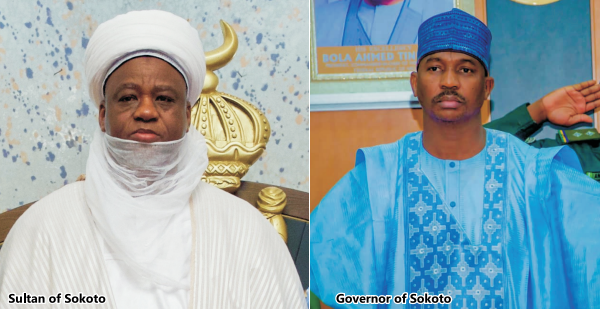The alleged political move by the Sokoto State governor, Ahmad Aliyu to dethrone the Sultan of Sokoto, Muhammadu Sa’ad Abubakar using the House of Assembly elicits reactions
By Udoka Ekeleme, Abuja
In the recent times, the traditional institutions in the country have come under serious attacks. The latest of these attacks is the alleged move by governor Ahmad Aliyu of Sokoto State to dethrone outrightly or whittle down the powers of the Sultan of Sokoto using the instrument of the state’s House of Assembly. After repeated denials by the Sokoto State government against moves to dethrone the Sultan of Sokoto, the Sokoto State House of Assembly had passed for first and second reading a Bill seeking to reduce the powers of the Sultan.
The bill, titled the Sokoto Emirate Council Amendment Bill, if passed into law, seeks to, among other things, strip the Sultan of powers to appoint the kingmakers and will also strip the Sultan of powers to appoint district heads without government approval, among other things.
But former Vice President, Atiku Abubakar, has, expressed concerns over the growing trend of state governments interfering with the traditional stool enthronement process.
He made this call via a statement issued on his X handle, emphasising the importance of protecting traditional institutions from state government arbitrariness, ensuring their stability and recognising their role in maintaining peace, security, and economic development in their domains.
Atiku acknowledged that while the current Constitution does not recognise traditional institutions, they have played a significant role in governance before colonialism and continue to do so.
He advocated for constitutional reform to define the responsibilities of traditional institutions and offices, citing the need to address security challenges at the local level.
Atiku also urged state governors to respect traditional institutions, representing the cultural heritage of the people.
According to Atiku: “Recent developments in the country have seen a growing tendency of state governments exerting influence in distorting the modalities of enthroning traditional stools.
“While it is understandable that the institutions of traditional rulership are in the exclusive purview of the state government, although through the local government authorities, it must be established that traditional institutions constitute a component of our governance structure. And thus, traditional institutions must be protected from the arbitrariness of state governments that threaten their stability.
“When the structure of ascension of traditional rulers is unstable, it will become equally difficult to maintain peace and orderliness in communities.”
In the same vein, the Muslim Rights Concern (MURIC), has also condemned the Sokoto State House of Assembly for passing the Emirate Council Amendment Bill, which it claims seeks to strip the Sultan of Sokoto of certain powers.
MURIC in a statement by its Executive Director, Prof. Ishaq Akintola, accused the government of attempting to weaken the Sultanate Council and undermine the traditional institution.
Akintola said, “The bill is outrageous, nauseating, and anachronistic. It is a direct attack on the traditional institution of Sokoto State. Instead of entrenching the powers of the Sultan, it is an undisguised attempt at weakening his powers and making him less relevant in the scheme of traditional settings.
“The governor is preparing the ground for dismantling the Sultanate Council and setting up his own personal Sultanate Council, a council that will be totally controlled from government house.”




